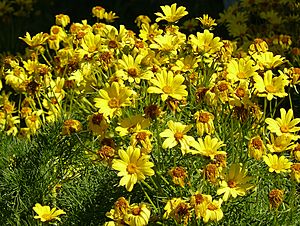Giant coreopsis facts for kids
Quick facts for kids Giant coreopsis |
|
|---|---|
 |
|
| Scientific classification |
|
| Kingdom: | Plantae |
| Clade: | Tracheophytes |
| Clade: | Angiosperms |
| Clade: | Eudicots |
| Clade: | Asterids |
| Order: | Asterales |
| Family: | Asteraceae |
| Genus: | Coreopsis |
| Species: |
C. gigantea
|
| Binomial name | |
| Coreopsis gigantea (Kellogg) H.M. Hall
|
|
| Script error: The function "autoWithCaption" does not exist. | |
| Synonyms | |
|
|
Script error: No such module "Check for conflicting parameters".
The Giant Coreopsis (scientific name: Coreopsis gigantea) is a really interesting plant that grows year after year. It's a woody perennial plant, which means it has a stem like a small tree. You can find it growing naturally along the coasts of central and southern California and also in northern Baja California, Mexico. It's also known simply as giant coreopsis.
Contents
Where Does Giant Coreopsis Grow?
This unique plant lives in special places along the coast. It likes areas called California coastal sage and chaparral. These are habitats with specific types of plants and weather. You can find it from about 45 to 180 feet (14 to 55 meters) above sea level.
It grows in sandy coastal dunes, on hillsides covered in chaparral plants, and on exposed sea cliffs. It's found along the coasts of Southern California and the Channel Islands. It also grows in the Central Coast area and near the San Francisco Bay Area. In Mexico, it's found on the northwestern Baja California Peninsula and Guadalupe Island.
Giant Coreopsis needs places where it almost never freezes. Its stem is a succulent, meaning it stores water. This helps it survive dry times, but it makes the plant very sensitive to cold. It can only handle temperatures down to about 25 degrees Fahrenheit (-4 degrees Celsius).
What Does Giant Coreopsis Look Like?
The stem of the Giant Coreopsis looks like a small tree trunk. It can grow up to 3 feet (1 meter) tall. The trunk is usually 1.5 to 4 inches (4 to 10 cm) thick. The whole plant can reach about 13 feet (4 meters) high and 6.5 feet (2 meters) wide.
During the dry summer, this plant loses its leaves. This is called being deciduous. When the leaves fall off, the bare trunk and branches look like a cool sculpture!
The bright green leaves and many yellow flowers grow only at the very top of the trunk. The rest of the trunk stays bare. The flowers look like large daisies. They can be anywhere from 2 to 8 inches (6 to 20 cm) across. Giant Coreopsis blooms in the spring and early summer.
How to Grow Giant Coreopsis
People sometimes grow Giant Coreopsis in their gardens. It's sold by special plant nurseries as an ornamental plant. It's a great choice for native plant gardens. It's also popular in drought tolerant gardens because it doesn't need much water.
This plant is also used in wildlife gardens. It helps local animals and insects. People also plant it for natural landscaping and in projects to bring back natural habitats.
Giant Coreopsis is very good at handling dry conditions. It needs soil that drains water well. It doesn't like too much moisture. You should water it very little during the summer months.
See also
 In Spanish: Coreopsis gigante para niños
In Spanish: Coreopsis gigante para niños
 | Janet Taylor Pickett |
 | Synthia Saint James |
 | Howardena Pindell |
 | Faith Ringgold |

